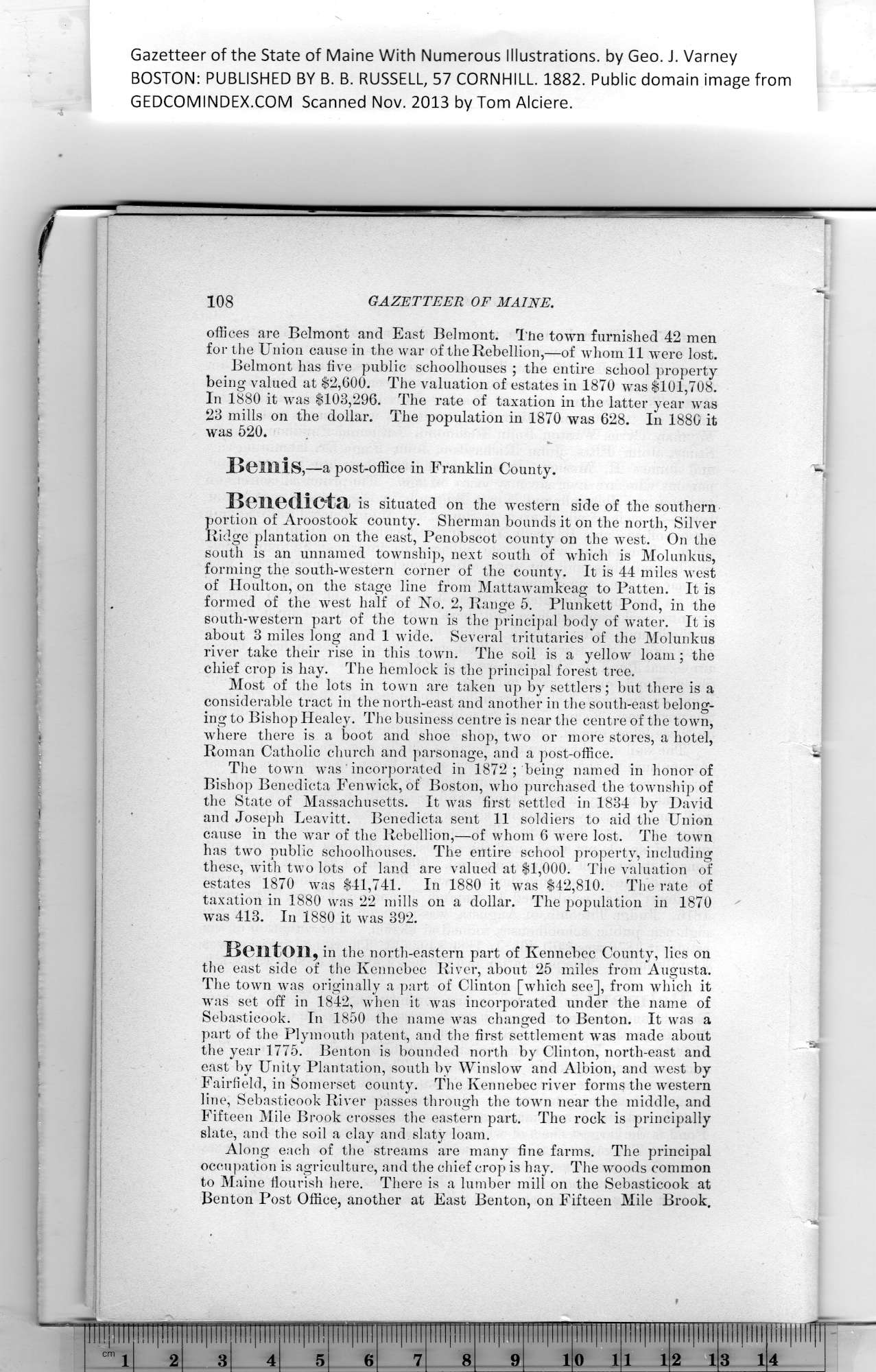|
Gazetteer of the State of Maine With Numerous Illustrations, by Geo. J. Varney
BOSTON: PUBLISHED BY B. B. RUSSELL, 57 CORNHILL. 1882. Public domain image from
108 GAZETTEER OF MAINE.
offices are Belmont and East Belmont. The town furnished 42 men
for the Union cause in the war of the Rebellion,—of whom 11 were lost.
Belmont has five public schoolhouses ; the entire school property
being valued at $2,600. The valuation of estates in 1870 was $101,708.
In 1880 it was $103,296. The rate of taxation in the latter year was
23 mills on the dollar. The population in 1870 was 628. In 1880 it
was 520.
Bemis,—a post-office in Franklin County.
Benedicta is situated on the western side of the southern
portion of Aroostook county. Sherman bounds it on the north, Silver
Ridge plantation on the east, Penobscot county on the west. On the
south is an unnamed township, next south of which is Molunkus,
forming the south-western corner of the county. It is 44 miles west
of Houlton, on the stage line from Mattawamkeag to Patten. It is
formed of the west half of No. 2, Range 5. Plunkett Pond, in the
south-western part of the town is the principal body of water. It is
about 3 miles long and 1 wide. Several tritutaries of the Molunkus
river take their rise in this town. The soil is a yellow loam; the
chief crop is hay. The hemlock is the principal forest tree.
Most of the lots in town are taken up by settlers; but there is a
considerable tract in the north-east and another in the south-east belong-
ing to Bishop Healey. The business centre is near the centre of the town,
where there is a boot and shoe sho|), two or more stores, a hotel,
Roman Catholic church and parsonage, and a post-office.
The town was incorporated in 1872 ; being named in honor of
Bishop Benedicta Fenwick, of Boston, who purchased the township of
the State of Massachusetts. It was first settled in 1834 by David
and Joseph Leavitt. Benedicta sent 11 soldiers to aid the Union
cause in the war of the Rebellion,—of whom 6 were lost. The town
has two public schoolhouses. The entire school property, including
these, with two lots of land are valued at $1,000. The valuation of
estates 1870 was $41,741. In 1880 it was $42,810. The rate of
taxation in 1880 was 22 mills on a dollar. The jiopulation in 1870
was 413. In 1880 it was 392.
Benton, in the north-eastern part of Kennebec County, lies on
the east side of the Kennebec River, about 25 miles from Augusta.
The town was originally a part of Clinton [which see], from which it
was set off in 1842, when it was incorporated under the name of
Sebastieook. In 1850 the name was changed to Benton. It was a
part of the Plymouth patent, and the first settlement w*as made about
the year 1775. Benton is bounded north by Clinton, north-east and
east by Unity Plantation, south by Winslow and Albion, and west by
Fairfield, in Somerset county. The Kennebec river forms the western
line, Sebastieook River passes through the town near the middle, and
Fifteen Mile Brook crosses the eastern part. The rock is principally
slate, and the soil a clay and slaty loam.
Along each of the streams are many fine farms. The principal
occupation is agriculture, and the chief crop is hay. The woods common
to Maine flourish here. There is a lumber mill on the Sebastieook at
Benton Post Office, another at East Benton, on Fifteen Mile Brook.
PREVIOUS PAGE ... NEXT PAGE
This page was written in HTML using a program written in Python 3.2
|
